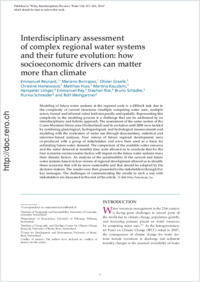Interdisciplinary assessment of complex regional water systems and their future evolution: how socioeconomic drivers can matter more than climate
- Reynard, Emmanuel Institute of Geography and Sustainability, University of Lausanne, Switzerland
- Bonriposi, Mariano Institute of Geography and Sustainability, University of Lausanne, Switzerland
- Graefe, Olivier Department of Geosciences, University of Fribourg, Switzerland
- Homewood, Christine Department of Geosciences, University of Fribourg, Switzerland
- Huss, Matthias Department of Geosciences, University of Fribourg, Switzerland
- Kauzlaric, Martina Institute of Geography and Oeschger Centre for Climate Change Research, University of Berne, Switzerland
- Liniger, Hanspeter Centre for Development and Environment, University of Berne, Switzerland
- Rey, Emmanuel Institute of Geography and Oeschger Centre for Climate Change Research, University of Berne, Switzerland
- Rist, Stephan Centre for Development and Environment, University of Berne, Switzerland
- Schädler, Bruno Institute of Geography and Oeschger Centre for Climate Change Research, University of Berne, Switzerland
- Schneider, Flurina Centre for Development and Environment, University of Berne, Switzerland
- Weingartner, Rolf Institute of Geography and Oeschger Centre for Climate Change Research, University of Berne, Switzerland
-
01.07.2014
Published in:
- Wiley Interdisciplinary Reviews: Water. - 2014, vol. 1, no. 4, p. 413–426
English
Modeling of future water systems at the regional scale is a difficult task due to the complexity of current structures (multiple competing water uses, multiple actors, formal and informal rules) both temporally and spatially. Representing this complexity in the modeling process is a challenge that can be addressed by an interdisciplinary and holistic approach. The assessment of the water system of the Crans-Montana-Sierre area (Switzerland) and its evolution until 2050 were tackled by combining glaciological, hydrogeological, and hydrological measurements and modeling with the evaluation of water use through documentary, statistical and interview-based analyses. Four visions of future regional development were co-produced with a group of stakeholders and were then used as a basis for estimating future water demand. The comparison of the available water resource and the water demand at monthly time scale allowed us to conclude that for the four scenarios socioeconomic factors will impact on the future water systems more than climatic factors. An analysis of the sustainability of the current and future water systems based on four visions of regional development allowed us to identify those scenarios that will be more sustainable and that should be adopted by the decision-makers. The results were then presented to the stakeholders through five key messages. The challenges of communicating the results in such a way with stakeholders are discussed at the end of the article.
- Faculty
- Faculté des sciences et de médecine
- Department
- Département de Géosciences
- Language
-
- English
- Classification
- Hydrology
- License
-
License undefined
- Identifiers
-
- RERO DOC 211426
- DOI 10.1002/wat2.1032
- Persistent URL
- https://folia.unifr.ch/unifr/documents/303728
Statistics
Document views: 161
File downloads:
- pdf: 279
